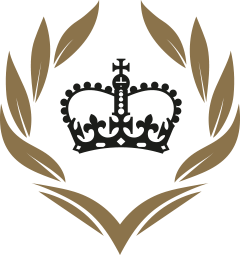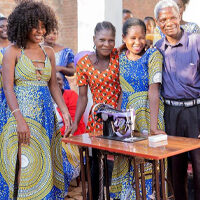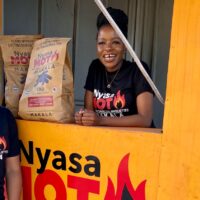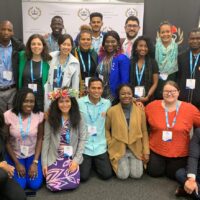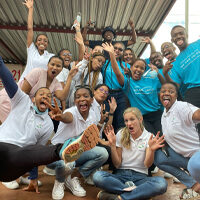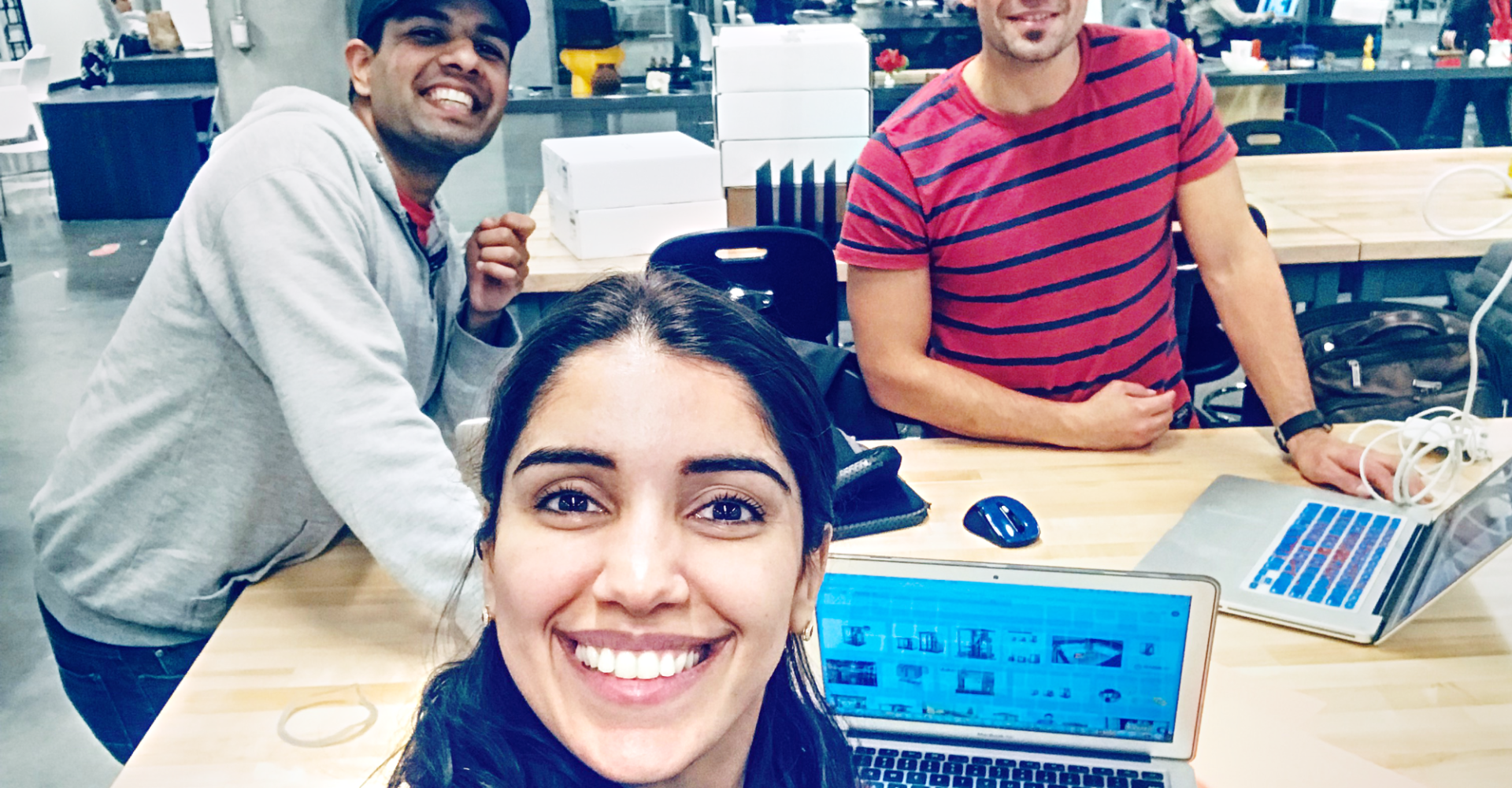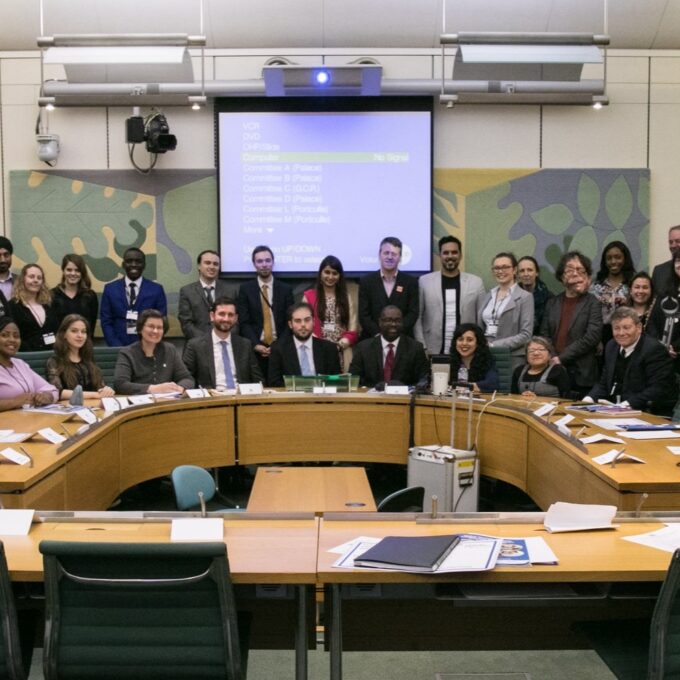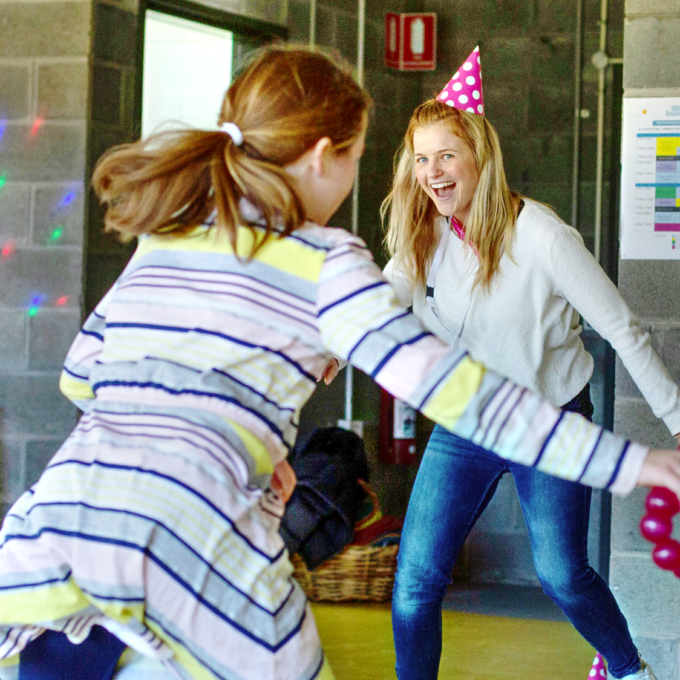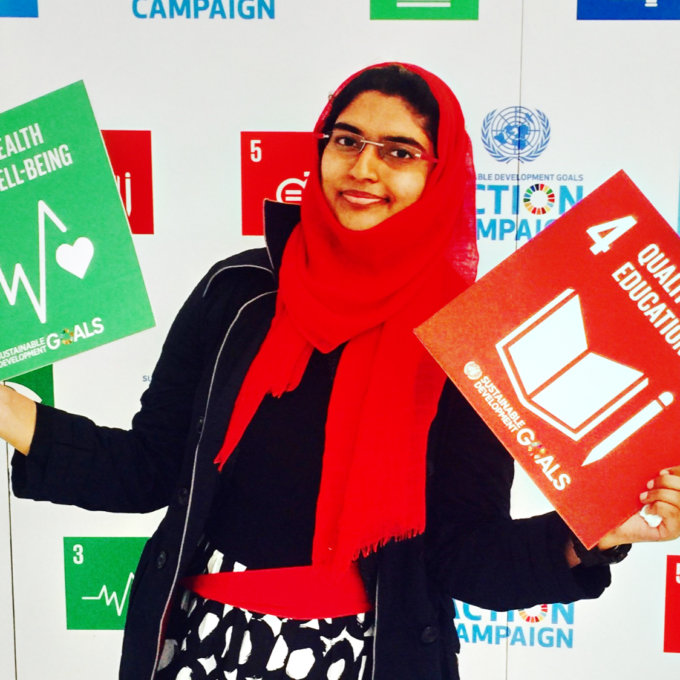By Midia Shikh Hassan
My name is Midia Shikh Hassan. I am a 27-year-old from Canada and my work revolves around using technology for social good. It took me many years to discover and understand what I wanted to do in life – specifically what change I wanted to influence on the world, and the legacy I wanted to leave behind. Being a Queen’s Young Leader gave me the chance to reflect back on the past few years of my life and what I’ve learnt. Here is my story and the lessons I’ve learnt so far.
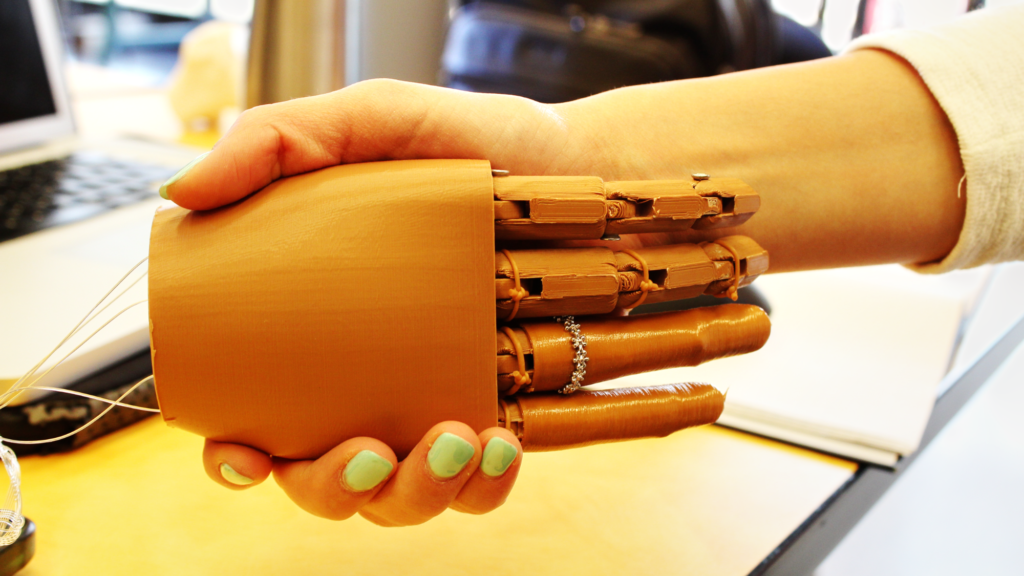
Finding my purpose
I always thought I knew who I wanted to be in life, or at least I felt like I should know what I want to do, and that you should have a bullet-proof plan for your future. However, as a young person, you don’t necessarily have all the experience and knowledge needed to make a decision as huge as ‘what do I want to do with my life’! In all this confusion, I decided to look at what I was interested in. I enjoyed science and had a fascination with the healthcare field, so I felt that a good start would be to explore the notion of a career in this sector, possibly as a practitioner or researcher.
With this in mind, I decided to study health sciences and biochemistry, although something in the back of my mind was still saying this wasn’t 100% right. To help me try and figure things out, I volunteered in DNA research labs to get some hands-on experience before graduating. I also asked my professors if I could read over their work to understand in more depth what their focuses and passions were. I can’t thank myself enough for deciding to explore this space, because although I saw and knew that what they were working on was noble, it was clear it wasn’t the path for me. It was time to explore something new.
Harnessing skills and passions
I completed my university course, but after graduating I felt lost. I felt like a failure. What I initially thought I wanted to do in life was not what I wanted anymore. I thought of completing graduate studies in medical research, but in my heart of hearts I knew this still wasn’t right. I had to accept that for me there was never going to be just one set trajectory for my life!
After talking to my family and friends, I decided to do another undergraduate degree in chemical engineering. I was interested in the design and processing elements of this course and I knew that engineering would provide me with new knowledge and skills. So, I began a fresh path along this route.
At the same time, I registered for an elective course called “Technology Entrepreneurship for Engineers and Computer Scientists”. This decision was life changing. Not only did it open my eyes to a space I thought was too foreign for me, but after taking this class, I gained the entrepreneurial skills, confidence and knowledge needed to start, launch and scale my own business or a project. What really excited me about this, was that I could now choose what my focus would be; instead of choosing a set career path or a certain industry, I could instead focus on what I was passionate about.
I started thinking about how I could use my new-found skills for good. For example, I had met a number of mothers who had autistic children and many of them were struggling to access therapy for their kids and support from their community. I wanted to do something to help, so began reading research about the autistic brain and what could be done to help create more welcoming spaces for kids with autism. I immediately felt lost trying to navigate the system and the key stakeholders in this area. This spurred me on to want to make a positive influence in this space and make it more tangible for others.
I decided to apply the knowledge I’d gained in the classroom to create my first business plan, and launched LetsLearnApp – a mobile-based feature that provides therapeutic games and consultations for kids with autism. I then started applying to competitions and funding avenues to validate my initiative.I applied to everything I was eligible for. I won some and I lost some, but I gained the skills, resources and network to help in my upcoming ventures.
I learnt so much from putting myself out there. I heard this saying once that “Your Network is Your Networth”. These words have consistently prompted me to get out of my comfort zone and grow my network. I started attending events that I didn’t want to attend (because they weren’t the key topics that I was interested in) and met some of the most interesting people in my life at those events including potential sponsors, donors and mentors. I also learnt that sharing ideas with others afforded me the opportunity to receive critical and constructive feedback to improve my work, and the chance to be connected to other people in the same space. With more confidence and knowledge behind me, I was also able to improve my presentation skills and understanding of business operations as well.
Feeling more energized, and now with a clearer vision in my mind, I used the remaining years of my studies to focus on learning new skills outside my comfort zone. I also started using Makerspace, a collaborative workspace inside a school, library or separate facility, which provides a variety of maker equipment such as 3D printers, laser cutters, soldering irons etc. to children, adults and entrepreneurs alike. Discovering this resource was key to unlocking the next phase of my entrepreneurial journey.
Dextra is born
I met Malik and Olivier at one of my university’s extra-curricular social entrepreneurship events. We quickly realised that we shared similar interests and were also all familiar with Makerspaces, and keen to leverage the resources that they offered. As engineering graduates, Malik and Olivier were directly involved in the Maker movement on campus as well. It was clear that between us we had a complimentary skill set and areas of expertise that enabled us to bring new perspectives to the table and become a really powerful team!
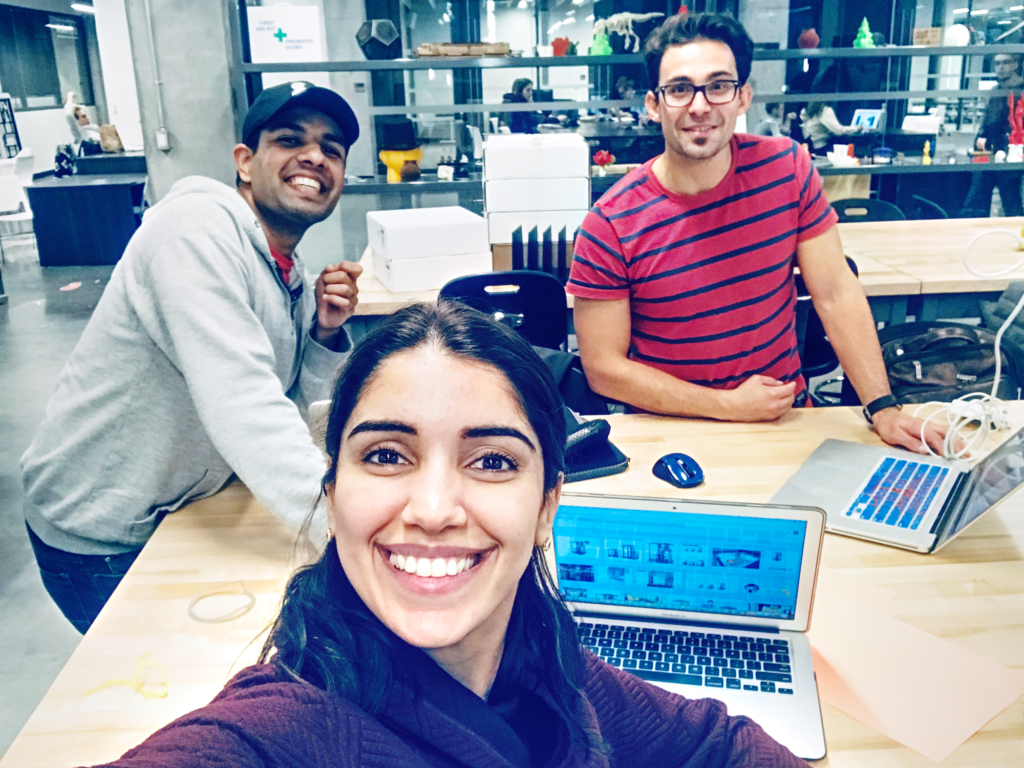
Like many countries at the time, Canada was grappling with the global refugee crisis. We all knew we wanted to do something to help, and our connections with Makerspaces meant we had an opportunity to create a really innovative solution. We started out by contacting local refugee groups and organizations in our city to enquire about the health care situation for refugees, and how we could help. I volunteered in programs and at events to help refugees get settled in Canada, gaining first-hand experience in this field. We then reached out to other groups around the globe who were working on similar, keen to learn from them and understand what we had to focus on. It became clear that access to good quality, affordable prosthetics was an issue for many refugees, who had lost limbs in the wars that they had fled to escape. It was this knowledge that sparked an idea between the team members. The 3D printers at Makerspace provided us with the perfect solution for prototype building and before we knew it, we had co-founded Dextra – an initiative that provides 3D printed prosthetics to refugees and people living in poverty.
Learning from failure and looking to the future
Although a simple solution, building prosthetics is by no means an easy task. Between us we had the technical and business skills to get this off the ground, but we all learned from one particular challenge.
The team and I were working on developing a 3D printed prosthetic for a double-amputated child in Morocco. However, due to measurement miscommunication and many technical issues, our first attempt meant that we sent the child two hands that did not fit. We felt like we had let the child down and really started to question whether we could achieve what we wanted to do. But we were determined to try again and not give up. We all were extremely busy during that time, but we still insisted that we would make it work. And it did work. We successfully sized the prosthetic to the child remotely and it was delivered to him. We felt absolutely amazing. Moments of triumph after challenges like these remind us of the important work we are trying to accomplish.
We have big dreams for Dextra and are keen to spread our knowledge and offer as much support as we can. We will also be heading to Ghana for two weeks next month to train young people in local communities on developing prosthetics.
It’s certainly not easy figuring out what you want to do in life, but here are my three top tips in trying to work it all out:
1. Know your focus. Start by listing what you enjoy doing and who is your role model is. This will help you narrow down what space/type of work you would like to be in.
2. Gain experience. Volunteer or ask to shadow employees at organizations that are working in a space you are interested in.
3. Give things a go! Don’t be afraid of trying things out. Failing is always better than not trying
Follow Dextra on Facebook and Twitter.
Main asset credit: Ryan Garland
